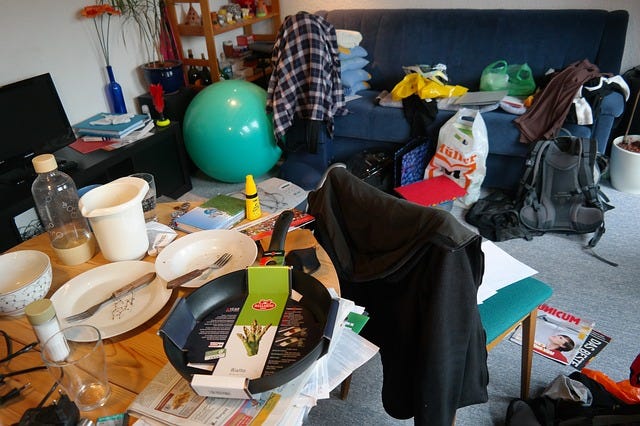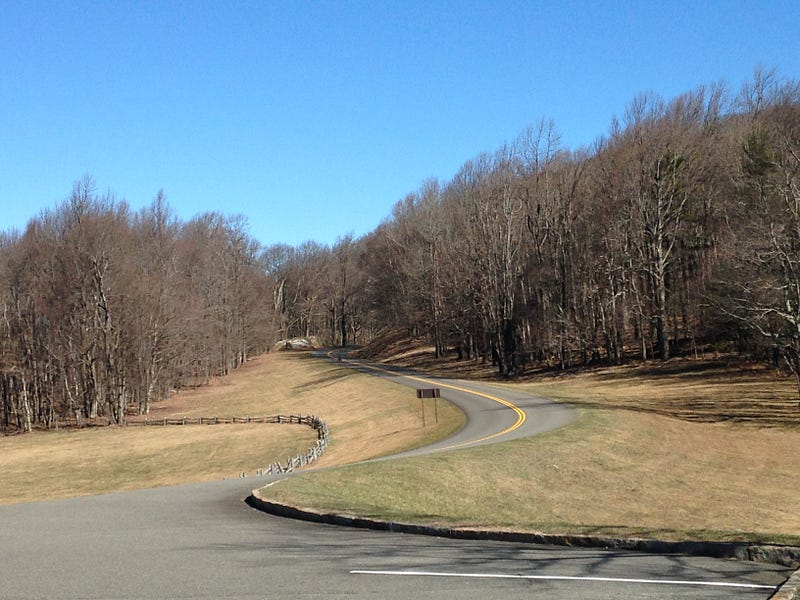
We drove up the west side of the east coast. Geographically, this is a beautiful country. I drove for three hours along the spectacular Blue Ridge Parkway. It was built by the government beginning in 1935, in part to give people jobs, and in part to give everyone a chance to enjoy the wonders of our country.
Although it is one of the most visited sites of the National Park Service it was almost totally empty as I drove through dozens of magnificent curves, surrounded by the Appalachian Mountains. Even with the hills dressed in their winter brown each new turn was a visual delight.


But looks can be deceiving; this great country is a mess. The politics are not the cause, they are the result of a society gone wrong. We are a prosperous, strong and creative country, yet so many are so lost, angry and stressed.
I am hardly working any more. I gave up my psychotherapy practice on the day with the most sunlight of last year. At that time I was tired. I had become almost immune to the craziness and suffering that was presented to me for nine hours a day. My view of life was becoming pretty cynical and suspect. I thought that if I could stay away from listening to misery for all those hours my mind would clear and my faith in the spirits and wisdom of the world would return.
That hasn’t happened.
The first thing that disrupts my feelings of peace and hope is that I am getting older, creakier and a bit crankier. I am still young-old and except for not being able to run or jump (lost my jump-shot), I am still very active. But surrounding me, many of my friends are breaking down. Several have already disappeared. Various chronic conditions have set in: diabetes, neuropathy, M.S., heart problems and several cancers. Due to the marvelous advances in medicines most have been patched together and are continuing on. But the cloud lingers over all of us. “Is this just a head ache?”
But the main disruption comes as I realize that the people I saw for therapy were at least insightful and brave enough to confront their difficulties. From them I usually heard about other family members who were raging destructive forces that negatively impacted the lives of dozens of people, but who never would come for treatment.
Now that I am away from the office I realize that it is not just the families of my patients, the entire world is full of these people. Every family has at least one. Anxiety, depression, anger, rejection, hyper-sensitivity, seem to be woven into our society, with few effective treatments. I am finding no difference between the people I interact with now, and those I was seeing at work, except almost all of my patients were much more open and aware about what was really going on in their minds and their lives.
(Yes, all of the following details are modified enough to protect the identities.)
A Patient: She grew-up with a very abusive mother and an alcoholic father who tried to protect her until he dropped dead. Five of her seven siblings are already dead from illnesses, accidents and addictions. She went through several abusive relationships as an adult and a long period of drinking heavily herself. She recovered and stabilized in her fifties. She still suffers from the physical pains left from all of the conflicts she endured. Now she takes care of herself, has a weekend man friend, and finally feels safe and in control.
A Friend’s Daughter: Grew up in an upper middle class home. She attended a good high school in which she faltered, so she was sent to a prep school, which got her into a private college that she didn’t finish. Her older brother is a software engineer with a nice family. She came home from college and got pregnant. Now, her daughter is twelve and being raised by her grandparents, while her mother watches TV, goes to doctors, goes shopping and complains about how difficult life is.
A Patient: She was raised by a father who thought he knew God, and a mother who believed that sex was the cause of all evil. She wasn’t allowed out of the house except for school until she was sixteen. She was married for six months but couldn’t take the pressure of a relationship. She now has learned some computer skills and works in a billing office. She has a few friends she sees on weekends. She has no TV and reads English novels every evening. She’s not a fan of religion.
A Friend’s ex-wife: In her early forties as her two daughters were becoming active adolescents, she freaked out and joined a fundamentalist church. All decisions were based on God, sin and the Bible. She started giving money to TV preachers and hovering over her daughters. Her husband finally divorced her and kept her away from their daughters. She now has limited contact with them, and they are at college. They think she is having an affair with the minister.
A Patient: He came from a wealthy, well educated family who had high expectations. They lived in a wealthy town and had an active social life. He started using cocaine on weekends with his friends. He really enjoyed doing that more than anything else. He started stealing from his family to pay for it. He lied to cover it up. He then began using heroin. He went into rehab. He went back to using. He went back to rehab. He went back to using. They sent him to live with an aunt who lived far away to get a new start. I don’t think it helped, but he wasn’t my patient any longer.
A Friend’s son: Same thing, except he’s living in a small apartment in another city and his parents pay his rent and send him a small allowance. He sends a text messages about once a month to tell them he’s still alive.
Those are three examples. I could easily give you sixty. I think that the mental health of the country has gotten worse, but not by a tremendous amount. What is different is that it is more apparent, and that it has less of a functional basis. By that I mean that in so many ways our lives are easier, safer, and offer more possibilities for fun, relaxation, creativity, community, and enjoyment than ever before. Everyone, except the very poorest and oppressed ten to 15 percent, are living with better food, shelter and safety than ever. There are difficulties, but there are usually pathways to improvement. Yet, it seems as if there is an uncertainty about the future which creates a constant underlying tension of insecurity. This insecurity creates a sense of distrust that make people very suspicious and defensive, and that limits cooperation, which stops progress.
It feels as if our primitive human brains are not equipped to take advantage of many of the technological advances that could make our lives so much easier and better. Technology has disrupted so many jobs and has intruded upon so many lifestyles that people need to learn totally new coping skills to survive.
But there is almost no one to teach those skills, because none of us have been here before.
Instead we have a plethora of gurus advocating old-style solutions, usually based on the usual aphorisms, cliches, and homilies. These are mostly derived from the old institutions of religion, pop-psychology or business schools: Faith, Mindfulness, Perseverance. Many are popular only due to clever marketing strategies.
Yes, there is certainly some wisdom in the advice they offer, but they no longer really address the problems we all have to deal with.. The world has changed. It operates very differently now. The tasks that people need to survive are very different. This is true because the way people work has changed. It’s mostly connected to technology. It’s much faster. It’s much more mental and less physical. Many jobs are not even necessary, as they can be done more efficiently by computers or robots. Because economics are different, relationships are different. Men and women now play different roles. People from other countries play different roles. Many people find this confusing and stressful.
For many of us, the goals we have in our minds as we wake up each day are less clear. It becomes easy to just chase after money, but that soon proves to be an endless grind that eats away our values, ethics and trust. So what’s next? People seem lost. It becomes an existential question about how to make life meaningful. If survival is easy, how can we feel accomplished? How can we feel grown-up? This seems especially confusing to men as it becomes difficult to prove masculinity when the tasks of life are so cerebral and require interpersonal and emotional skills. Perhaps that contributes to the difficulties many women have in finding a rewarding relationship with a man, as guys seem so 20th Century, and so immature.
The short term coping solution in this country, sadly has been what usually happens during times of transition. The major power structure plays upon the fears of the majorities, splits them into smaller groups and turns them against each other. As newer, lower skill jobs become scarce, the affected groups fight each other for the scraps instead of planning for a better, cooperative future. Hostility between people increases, stress increases. As things become more complex and more difficult more people become overwhelmed and just drop out all together, ending up hiding in bed, living in someone’s basement, or trolling on the Internet.
All of these struggles are sadly ironic. The hope was that new technologies would bring positive changes for everyone. Our survival could be guaranteed. There is already the means to feed and shelter all of us. If properly employed, technology could release us from meaningless work and grant us time for more leisure and richer, more satisfying lives. But the thought of that, and the lack of structure that comes with it, seems to frighten the majority of people. Can our brains, bodies and societies cope with so much freedom? Reaching those goals demands new skills, such as cooperation and sharing. It demands communicating and compromising; listening and understanding; inclusion and acceptance.
Those are much more complex skills than individualism, competition, and a quest for money, power and dominance. The most difficult part is that any lasting, positive change requires a basic level of trust. Humans have not shown a strong ability to do that, even within their own tribes or families. I’ve seen too many families in which a man has gotten way too involved with his brother’s wife. That usually upsets the family dynamics and trust.
But adaptation to a new way of living is possible. Our early ancestors lived in tribes and had lives based on sharing and cooperation. So we have those old pathways somewhere in our brains. I’ve read that agriculture and the idea of the ownership of land put an end to that.
We can’t go back to hunting and gathering any more than we can go back to all of us growing our own food. But we do have the capability to change, learn and adjust to new situations. The ones who are able to learn the fastest will be the ones who survive and have more children to whom they can teach those skills.
We are in a time a rapid transition. The old ways don’t work, but people are clinging to them desperately, even when it means denying obvious truths. Changes causes uncertainty. Uncertainty causes fear. Fear quickly raises the level of distrust.
Transitions are never easy or smooth. Just ask your five year-old to turn off the iPad, watch how happily she makes the change.
(references for many of the ideas mentioned are available upon request. )
1 comment:
I always appreciate your point of view! Thank you!
Post a Comment